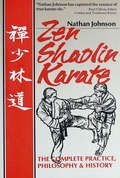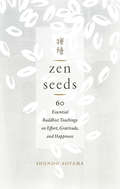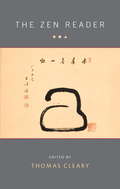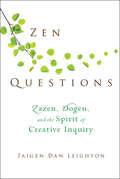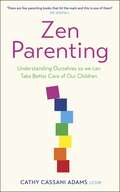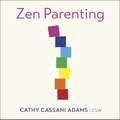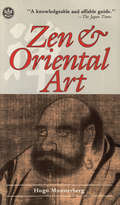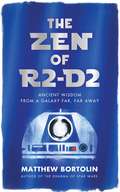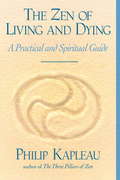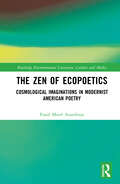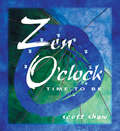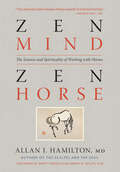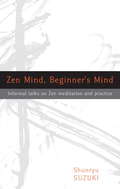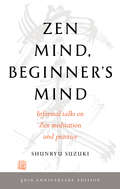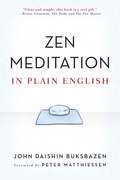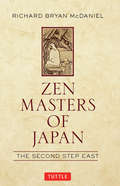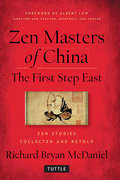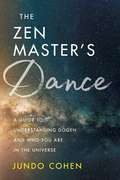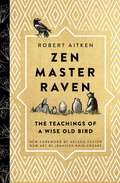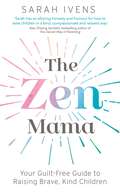- Table View
- List View
Zen Shaolin Karate
by Nathan JohnsonIn Zen Shaolin Karate, Johnson explains and illustrates in precise detail every subtle movement of two of karate's most common kata, and provides historical testimony for his explanations by integrating his findings with Zen philosophy. The author's unique interpretations of the Nai Fuan Chin and Saam Chin kata will destroy the barriers separating karate, kung fu, and aikido, and will revolutionize how kata are applied in all karate styles.
Zen Shaolin Karate
by Nathan JohnsonIn Zen Shaolin Karate, Johnson explains and illustrates in precise detail every subtle movement of two of karate's most common kata, and provides historical testimony for his explanations by integrating his findings with Zen philosophy. The author's unique interpretations of the Nai Fuan Chin and Saam Chin kata will destroy the barriers separating karate, kung fu, and aikido, and will revolutionize how kata are applied in all karate styles.
Zen Seeds: 60 Essential buddhist Teachings on Effort, Gratitude, and Happiness
by Shundo AoyamaFrom a living treasure of Japanese Zen, an inspiring collection of teachings about the power of Buddhist practice to help you transform suffering and touch the marrow of your life.In this sparkling collection of teachings, Japanese Zen master Shundo Aoyama Roshi offers an entry to the authentic practice of Zen Buddhism. Or, rather, she offers a myriad of entries—for Zen Seeds, as its title suggests, is comprised of brief chapters meant to plant seeds of wisdom and compassion in readers. Ranging from classical Zen sources, such as the teachings of Dogen and the encounter stories of the koans, to anecdotes from Aoyama’s fascinating life and from those of her many students, the book paints a profoundly compelling portrait of the transformative possibilities of Zen. A pioneering female leader in the Soto Zen school, Aoyama Roshi demonstrates the power of practice for anyone seeking to lead a life of greater conviction and spiritual nourishment.
The Zen Reader
by Thomas ClearyFounded by Bodhidharma centuries ago in China, Zen and its teachings have since spread widely, exerting a tremendous cultural influence not only across Asia, but also the modern West. To this day, Zen inspires young and old, from all walks of life, to see the world with fresh eyes--beyond our usual assumptions and prejudices. This compendium of a thousand years of Zen teaching presents the essence of the tradition through stories, sayings, talks, and records of heart-to-heart encounters with Zen masters. The great expositors of the tradition, whose voices are recounted here, encourage us to let go of our clinging and intellectual grasping, and to open ourselves to embrace reality exactly as it is.
Zen Questions
by Taigen Dan LeightonWhether speaking of student or master, Zen hinges on the question. Zen practice does not necessarily focus on the answers, but on finding a space in which we may sustain uncertainty and remain present and upright in the middle of investigations. Zen Questions begins by exploring "The World of Zazen,"--the foundational practice of the Zen school--presenting it as an attitude of sustained inquiry that offers us an entryway into true repose and joy. From there, Leighton draws deeply on his own experience as a Zen scholar and teacher to invite us into the creativity of Zen awareness and practice. He explores the poetic mind of Dogen with the poetry of Rumi, Mary Oliver, Gary Snyder, and even "the American Dharma Bard" Bob Dylan. What's more, Leighton uncovers surprising resonances between the writings of America's Founding Fathers--including Thomas Jefferson and Ben Franklin--and the liberating ideals at the heart of Zen.
Zen Parenting: Understanding Ourselves so we can Take Better Care of Our Children
by Cathy Cassani Adams'There are few parenting books that hit the mark and this is one of them!' Dr ShefaliWe can't always plan for what's next - that's been made more and more clear in the past few years. The truth is that life is never predictable, especially for parents. What is possible is an unlimited capacity for compassion and caring - for yourself and your children. As you navigate the uncertainty with openness and humility, you find the clarity, connection, and community that is Zen Parenting. Using the seven chakras, therapist Cathy Cassani Adams discusses parenting issues such as school pressure, self-care, emotional intelligence, anxiety, sexuality and gender, and more, while offering concrete examples and strategies to help you wake up to your life as a parent. Zen Parenting guides you to:- Establish your physical, emotional and mental foundation- Practice creativity and how to access your emotions- Develop your sense of self and allow your kids to do the same- Experience openheartedness, empathy and compassion- Discover genuine and meaningful communication- Explore mindfulness, meditation and your own intuition- Connect to something greater than yourself
Zen Parenting: Understanding Ourselves so we can Take Better Care of Our Children
by Cathy Cassani AdamsAn audiobook that helps parents to pay attention to daily life and the relationships they are creating with their children.We easily fall into the trap of parenting without a real awareness of what we're doing and why we're doing it, invariably using other peoples' ideas and values or outdated child-rearing techniques.A Zen Parent, is not a label or prescriptive way to parent, but a willingness to stay present with what's happening and do the right thing. It's a commitment to an imperfect practice of continual self-awareness so we can show up for our children in an authentic and mindful way. The one thing that can be counted on throughout parenting is change - just when we understand our child's experience or buy the right size clothes, they change and grow. Just when we get comfortable with typical life challenges, the world experiences a global pandemic. Being able to parent and live well requires a willingness to get comfortable with disorder and uncertainty, and even more of a willingness to be introspective and creative to once again find reorder.Structured through the 7 bodily chakras, which are used as a framework for human existence, this book is for parents who want to raise their children in a more self-aware and mindful way, to expand their thinking about who they are and what they want to share with their kids. It's a self-study and reminder to pay attention to daily life and the relationships they are creating with their children. And it's an opportunity to live what they want their kids to learn, to show up as themselves so their kids know they can do the same.(P) 2022 Hachette Audio
Zen & Oriental Art
by Hugo MunsterbergZen & Oriental Art is an indispensable, beautifully illustrated introduction to the influences of Zen on Oriental painting. folk art, and architecture, with a special section on the role of Zen in twentieth-century art and architecture in the West. Dr. Munsterberg quite naturally begins with an explanation of Zen Buddhism itself, and the historical development of Zen in India and China. Zen's particularly rapid adoption in Japan is covered in the next chapter, which is followed by sections on the Zen art of ink painting in both China and Japan. Also described are the influences of Zen on Japanese architecture, and the intimate connection of the religion with the Japanese tea ceremony. Of particular interest to Western readers is the chapter on Zen andtwentieth-century Western art.
Zen & Oriental Art
by Hugo MunsterbergZen & Oriental Art is an indispensable, beautifully illustrated introduction to the influences of Zen on Oriental painting. folk art, and architecture, with a special section on the role of Zen in twentieth-century art and architecture in the West. Dr. Munsterberg quite naturally begins with an explanation of Zen Buddhism itself, and the historical development of Zen in India and China. Zen's particularly rapid adoption in Japan is covered in the next chapter, which is followed by sections on the Zen art of ink painting in both China and Japan. Also described are the influences of Zen on Japanese architecture, and the intimate connection of the religion with the Japanese tea ceremony. Of particular interest to Western readers is the chapter on Zen andtwentieth-century Western art.
The Zen of R2-D2: Ancient Wisdom from a Galaxy Far, Far Away
by Matthew BortolinEntertaining and engaging, this new follow-up to Wisdom&’s bestseller The Dharma of Star Wars stands on its own and will captivate a broad audience with the Star Wars story from a Buddhist perspective.Did you ever wonder why R2-D2 is: Always calm and cool under pressure, The key to the rebellion&’s survival, The one who never fails to save the day? Could it be because he&’s secretly a Zen master? Discover your inner R2—and the truth about who you really are! This delightful and illuminating romp unfolds in the form of a fictional dialogue between the author—a die-hard Star Wars devotee with a deep connection to Zen—and two cosplayers dressed as C-3PO and R2-D2 who insist on being called by their character names. Along the way, you&’ll come to see what everyone&’s favorite astromech can teach us about peace, happiness, and life&’s true meaning.
The Zen of Living and Dying: A Practical and Spiritual Guide
by Philip KapleauTo live life fully and die serenely--surely we all share these goals, so inextricably entwined. Yet a spiritual dimension is too often lacking in the attitudes, circumstances, and rites of death in modern society. Kapleau explores the subject of death and dying on a deeply personal level, interweaving the writings of Western religions with insights from his own Zen practice, and offers practical advice for the dying and their families.
The Zen of Ecopoetics: Cosmological Imaginations in Modernist American Poetry (Routledge Environmental Literature, Culture and Media)
by Enaiê Mairê AzambujaThis book is the first comprehensive study investigating the cultural affinities and resonances of Zen in early twentieth-century American poetry and its contribution to current definitions of ecopoetics, focusing on four key poets: William Carlos Williams, Marianne Moore, Wallace Stevens, and E.E. Cummings. Bringing together a range of texts and perspectives and using an interdisciplinary approach that draws on Eastern and Western philosophies, including Zen and Taoism, posthumanism and new materialism, this book adds to and extends the field of ecocriticism into new debates. Its broad approach, informed by literary studies, ecocriticism, and religious studies, proposes the expansion of ecopoetics to include the relationship between poetic materiality and spirituality. It develops ‘cosmopoetics’ as a new literary-theoretical concept of the poetic imagination as a contemplative means to achieving a deeper understanding of the human interdependence with the non-human. Addressing the critical gap between materialism and spirituality in modernist American poetry, The Zen of Ecopoetics promotes new forms of awareness and understanding about our relationship with non-human beings and environments. It will be of interest to scholars, researchers, and students in ecocriticism, literary theory, poetry, and religious studies.
Zen O'Clock: Time to Be
by Scott ShawA new way to look at clocks and calendars—and learn to live more peacefully in the present. Imagine being able to step beyond the controlling hands of clocks, calendars, and schedules to discover the mystical process that will give you an entirely new perspective of time. Inside this book are insightful aphorisms that will help you live more peacefully in the present. With each page, Scott Shaw, an expert in meditative consciousness, helps you throw away phrases like &“wasted time&” and &“time constraints&”—and understand the difference between what time is and what we perceive it to be. Imagine, right now, time in your hands!
Zen Mind, Zen Horse: The Science and Spirituality of Working with Horses
by Allan J. Hamilton“Far more than a book about how to care for a horse, though it stands out as one of the best on the subject . . . beautiful” (Susan Richards, author of Chosen by a Horse). This unique guide to horsemanship incorporates Eastern philosophy to describe how horses understand and respond to the flow of vital energy around them, and how they use this energy, called chi, to communicate with their herd, express dominance, and sense predators. Written by the award-winning author of The Scalpel and the Soul, and including forewords by Monty Roberts and Dr. Robert Miller, Zen Mind, Zen Horse shares safe, simple techniques to make you more receptive to your animal’s chi, so you can develop a calm and effective training style that will not only help your horse follow commands, but strengthen the spiritual bond between horse and rider.
Zen Mind, Beginner's Mind
by David Chadwick Shunryu Suzuki"In the beginner's mind there are many possibilities, but in the expert's there are few." So begins this most beloved of all American Zen books. Seldom has such a small handful of words provided a teaching as rich as has this famous opening line. In a single stroke, the simple sentence cuts through the pervasive tendency students have of getting so close to Zen as to completely miss what it's all about. An instant teaching on the first page. And that's just the beginning. In the forty years since its original publication, Zen Mind, Beginner's Mind has become one of the great modern Zen classics, much beloved, much reread, and much recommended as the best first book to read on Zen. Suzuki Roshi presents the basics--from the details of posture and breathing in zazen to the perception of nonduality--in a way that is not only remarkably clear, but that also resonates with the joy of insight from the first to the last page. It's a book to come back to time and time again as an inspiration to practice, and it is now available to a new generation of seekers in this fortieth anniversary edition, with a new afterword by Shunryu Suzuki's biographer, David Chadwick.
Zen Mind, Beginner's Mind: 50th Anniversary Edition
by Shunryu SuzukiNamed one of the 100 Best Spiritual Books of the Twentieth Century (Spirituality & Practice)A 50th Anniversary edition of the bestselling Zen classic on meditation, maintaining a curious and open mind, and living with simplicity."In the beginner's mind there are many possibilities, but in the expert's there are few."So begins this most beloved of all American Zen books. Seldom has such a small handful of words provided a teaching as rich as has this famous opening line. In a single stroke, the simple sentence cuts through the pervasive tendency students have of getting so close to Zen as to completely miss what it's all about. It is an instant teaching on the first page--and that's just the beginning.In the fifty years since its original publication, Zen Mind, Beginner's Mind has become one of the great modern spiritual classics, much beloved, much reread, and much recommended as the best first book to read on Zen. Suzuki Roshi presents the basics--from the details of posture and breathing in zazen to the perception of nonduality--in a way that is not only remarkably clear, but that also resonates with the joy of insight from the first to the last page.
Zen Meditation in Plain English
by Peter Matthiessen John Daishin BuksbazenAn excellent, practical introduction to Zen meditation. Written in a warm and easily accessible style, this book appeals to anyone with an interest in meditation, Zen, or, as is often the case today, a combination of the two. The book emphasizes the importance of receiving good instruction and of finding groups to practice with, yet it lays out the necessary steps to practice Zen meditation on your own. The book includes easily followed exercises to help the reader along. For anyone looking to uncover a clear and insightful path into the philosophy and practice of Zen meditation, this book represents the culmination of that search.
Zen Masters of Japan
by Richard Bryan McdanielZen Masters of Japan is the second book in a series that traces Zen's profoundly historic journey as it spread eastward from China and Japan, toward the United States. Following Zen Masters of China, this book concentrates on Zen's significant passage through Japan. More specifically, it describes the lineage of the great teachers, the Pioneers who set out to enlighten an island ready for an inner transformation based on compassionate awareness.While the existing Buddhist establishment in Japan met early Zen pioneers like Dogen and Eisai with fervent resistance, Zen Buddhism ultimately perservered and continued to become further transformed in its passage through Japan. The Japanese culture and Japanese Buddhism practices further deepened and strengthened Zen training by combining it with a variety of esoteric contemplative arts-the arts of poetry, the tea ceremony, calligraphy, and archery. Zen Masters of Japan chronicles this journey, and shows how the new practices soon gained in popularity among all walks of life-from the lowly peasant, offering a hope of reincarnation and a better life; to the Samurai warrior due to its casual approach to death; to the ruling classes, challenging the intelligentsia because of its scholarly roots. A collection of Zen stories, meditation, and their wisdom, Zen Masters of Japan also explores the illusive state of 'No Mind' achieved in Japan that is so fundamental to Zen practices today.
Zen Masters of China
by Albert Low Richard Bryan Mcdaniel[Zen Masters of China presents more than 300 traditional Zen stories and koans, far more than any other collection. Retelling them in their proper place in Zen's historical journey, it also tells a larger story: how, in taking the first step east from India to China, Buddhism began to be Zen.]The stories of Zen are unlike any other writing, religious or otherwise. Used for centuries by Zen teachers as aids to bring about or deepen the experience of awakening, they have a freshness that goes beyond religious practice and a mystery and authenticity that appeal to a wide range of readers.[Placed in chronological order, these stories tell the story of Zen itself, how it traveled from West to East but also how it was transformed in that journey, from an Indian practice to something different in China (Ch'an) and then more different still in Japan (Zen). The fact that its transmission was so human, from teacher to student in a long chain from West to East, meant that the cultures it passed through inevitably changed it.Zen Masters of China is first and foremost a collection of mind-bending Zen stories and their wisdom. More than that, without academic pretensions or baggage, it recounts the genealogy of Zen Buddhism in China and, through the stories themselves, illuminates how Zen became what it is today.]
Zen Masters of China: The First Step East
by Richard Bryan Mcdaniel Albert Low[Zen Masters of China presents more than 300 traditional Zen stories and koans, far more than any other collection. Retelling them in their proper place in Zen's historical journey, it also tells a larger story: how, in taking the first step east from India to China, Buddhism began to be Zen.]The stories of Zen are unlike any other writing, religious or otherwise. Used for centuries by Zen teachers as aids to bring about or deepen the experience of awakening, they have a freshness that goes beyond religious practice and a mystery and authenticity that appeal to a wide range of readers.[Placed in chronological order, these stories tell the story of Zen itself, how it traveled from West to East but also how it was transformed in that journey, from an Indian practice to something different in China (Ch'an) and then more different still in Japan (Zen). The fact that its transmission was so human, from teacher to student in a long chain from West to East, meant that the cultures it passed through inevitably changed it.Zen Masters of China is first and foremost a collection of mind-bending Zen stories and their wisdom. More than that, without academic pretensions or baggage, it recounts the genealogy of Zen Buddhism in China and, through the stories themselves, illuminates how Zen became what it is today.]
Zen Masters of China
by Richard Bryan Mcdaniel Albert Low[Zen Masters of China presents more than 300 traditional Zen stories and koans, far more than any other collection. Retelling them in their proper place in Zen's historical journey, it also tells a larger story: how, in taking the first step east from India to China, Buddhism began to be Zen.]The stories of Zen are unlike any other writing, religious or otherwise. Used for centuries by Zen teachers as aids to bring about or deepen the experience of awakening, they have a freshness that goes beyond religious practice and a mystery and authenticity that appeal to a wide range of readers.[Placed in chronological order, these stories tell the story of Zen itself, how it traveled from West to East but also how it was transformed in that journey, from an Indian practice to something different in China (Ch'an) and then more different still in Japan (Zen). The fact that its transmission was so human, from teacher to student in a long chain from West to East, meant that the cultures it passed through inevitably changed it.Zen Masters of China is first and foremost a collection of mind-bending Zen stories and their wisdom. More than that, without academic pretensions or baggage, it recounts the genealogy of Zen Buddhism in China and, through the stories themselves, illuminates how Zen became what it is today.]
The Zen Master's Dance: A Guide to Understanding Dogen and Who You Are in the Universe
by Jundo CohenZen Master's Dance makes some of Zen&’s subtlest teaching deeply personal and freshly accessible.Eihei Dogen—the thirteenth-century Japanese Zen Master of peerless depth and subtlety—heard the music of the universe that sounds as all events and places, people, things, and spaces. He experienced reality as a great dance moving through time, coming to life in the thoughts and acts of all beings. It is a most special dance, the dance that the whole of reality is dancing, with nothing left out. All beings are dancing, and reality is dancing as all beings. In The Zen Master&’s Dance, Jundo Cohen takes us deep into the mind of Master Dogen—and shows us how to join in the great and intimate dance of the universe. Through fresh translations and sparkling teaching, Cohen opens up for us a new way to read one of Buddhism&’s most remarkable spiritual geniuses.
Zen Master Raven: The Teachings of a Wise Old Bird
by Jennifer Rain Crosby Nelson Foster Robert AitkenA uniquely playful and incisive collection of Zen teaching stories from a beloved American master.A Modern Classic. In the tradition of the great koan collections and the records of ancient masters, Robert Aitken distills a lifetime of teaching down to its essence. Intriguing and deceptively simple, Zen Master Raven is a brilliant encapsulation of Zen in over a hundred koan-like encounters alongside many charming illustrations. Featuring curious beginners like Mallard and Mole and profound teachers like Brown Bear, Moose Roshi, and Zen Master Raven himself, this classic of contemporary Zen and will inspire seekers for generations to come.
The Zen Mama: Your guilt-free guide to raising brave, kind children
by Sarah IvensLet go of parenting expectations and fears to raise courageous, confident children.The Zen Mama philosophy is that mother and child complement each other in adventures and experiences, always putting safety first but without getting caught up in the anxieties, drama, impossible expectations and mental baggage that too often comes along with modern parenting. Learning to become a Zen Mama will help you grow and nurture a Zen Child - someone who isn't afraid to be different, who can stand up for himself or his friends, and can travel the world and experiment with new things without being overwhelmed with self-doubt or being scared. Full of facts, actionable advice and practical tips, this book will be about combining the heart and the head with what works for you and your family, not comparing yourselves to others or meeting a societal standard. It will support and nurture the mother's journey like a wise and sympathetic friend and offers ideas and experience rather than judgement.The Zen Mama will help you to find your purpose as a mother. It will instil the self-belief you need to help create a resilient, creative, caring and smart child - and help to survive the journey.
The Zen Mama: Your guilt-free guide to raising brave, kind children
by Sarah IvensLet go of parenting expectations and fears to raise courageous, confident children.The Zen Mama philosophy is that mother and child complement each other in adventures and experiences, always putting safety first but without getting caught up in the anxieties, drama, impossible expectations and mental baggage that too often comes along with modern parenting. Learning to become a Zen Mama will help you grow and nurture a Zen Child - someone who isn't afraid to be different, who can stand up for himself or his friends, and can travel the world and experiment with new things without being overwhelmed with self-doubt or being scared. Full of facts, actionable advice and practical tips, this book will be about combining the heart and the head with what works for you and your family, not comparing yourselves to others or meeting a societal standard. It will support and nurture the mother's journey like a wise and sympathetic friend and offers ideas and experience rather than judgement.The Zen Mama will help you to find your purpose as a mother. It will instil the self-belief you need to help create a resilient, creative, caring and smart child - and help to survive the journey.
